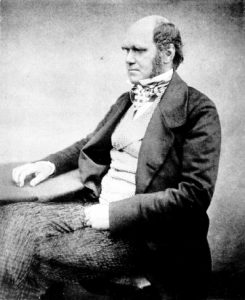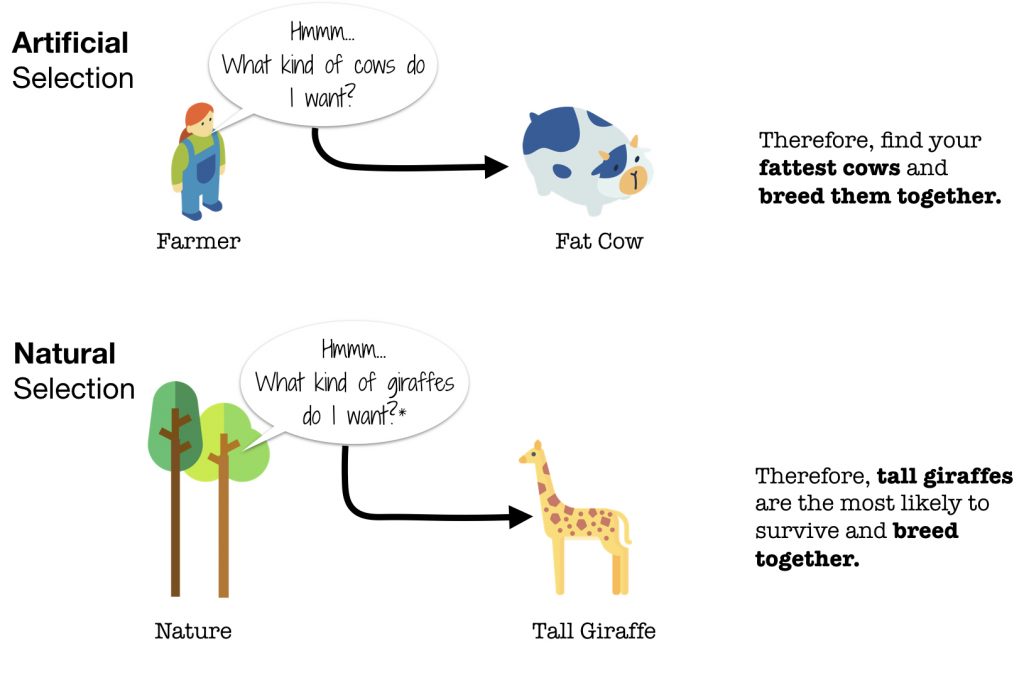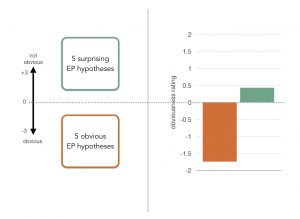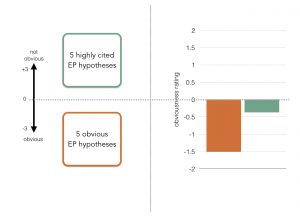1 Evolution and Evolutionary Psychology
Learning Objectives
By the end of this chapter you should be able to:
- Describe how Darwin developed his theory of natural selection.
- Compare and contrast artificial selection and natural selection.
- Identify and explain the 3 key ingredients for natural selection.
- Define psychology as an academic discipline.
- Explain how evolutionary psychologists attempt to apply evolutionary theory to explain human behavior and mental processes.
Charles Darwin &
The Theory of Evolutionary Theory

While Charles Darwin proposed the theory of evolution, he was not the first to introduce the idea of evolution. Some natural philosophers, including his grandfather Erasmus Darwin, already believed that species evolved over time.
Evolution is the notion that species change over time.
The problem was that no one had worked out the mechanism for evolution. If species change over time, what is the engine driving that change?
There was no satisfying answer to that question when Darwin embarked on a 5 year voyage on the HMS Beagle, serving as the ship’s naturalist. His primary role was to collect, organize and catalogue the novel plants and animals he encountered on the voyage. It was during his work on this voyage that Darwin’s theory slowly started to percolate.
External Source: Voyage of the Beagle
This video by Extra Credits tells the story of Darwin’s early life
and his auspicious voyage on the HMS Beagle.
Artificial Selection vs. Natural Selection

Icons made by Freepik from www.flaticon.com
Natural Selection: 3 Essential Ingredients
Click on the ‘+’ symbols in the image below to expand on related concepts.
Evolutionary Psychology
How does evolution apply to the scientific study of human behavior and mental processes? Think back to the interactive image Natural Selection: 3 Essential Ingredients. When you thought about ‘traits’, where you thinking about behavior or mental events? Most people tend to assume that evolution applies to physical traits, but not many people assume that evolution might apply to psychological or behavioral traits.
Evolutionary psychology attempts to use evolutionary theory to explain patterns of behavior in humans. This branch of psychology considers humans’ shared evolutionary history, and the kinds of behaviors or mental processes that may have been helpful for survival and/or reproduction during our evolutionary past.
If we look back on the interactive image Natural Selection: 3 Essential Ingredients, each of these ingredients can be translated into psychological terms.
Natural Selection for Behavior & Mental Events: 3 Essential Ingredients
- Behavioral or mental traits are heritable.
- Behavioral or mental traits vary.
- Variation in behavioral or mental traits results in differential reproduction.
Are Evolutionary Psychology Hypotheses Falsifiable?
Psychology is the scientific study of the mind and behavior. Can evolutionary psychology really be looked at scientifically? Researchers have argued that evolutionary psychology theories do produce hypotheses that can be falsified, and therefore pass the test of a scientific discipline. However, how falsifiable are evolutionary psychology hypotheses?

Tramifow and Gambicorta (2012) decided to test this empirically. They defined falsifiable as a hypothesis that was unlikely to be true if the theory wasn’t true. Using that criteria they selected 10 evolutionary psychology hypotheses, 5 they felt were obvious (i.e. probably true even if the theory isn’t true) and 5 they felt were surprising (i.e. unlikely to be true if the theory isn’t true). Participants agreed with the researchers assessments, rating the obvious hypotheses as obvious, and surprising hypotheses as not-obvious.

In a second experiment, the researchers compared 5 obvious evolutionary psychology hypotheses with 5 highly cited evolutionary psychology hypotheses. The highly-cited hypotheses served as a proxy for ‘typical’ evolutionary psychology hypotheses. Participants agreed with the researchers that the obvious hypotheses were in fact obvious. What’s more compelling is that the participants also rated the highly-cited hypotheses are relatively obvious as well.
These results suggest that while some evolutionary psychology hypotheses are falsifiable, the typical hypothesis is obvious. As a consequence, many of the biggest findings from the field are evidence that serve to verify theories that are probably not falsifiable to begin with.
What’s Next?
In the rest of this book, we will explore some controversies in Evolutionary Psychology. Each chapter will take a look at a specific aspect of evolutionary psychology to scrutinize the evidence researchers are collecting and the conclusions they are drawing to help give the reader a broader perspective.
Chapter References
Buss, D. (2019). Evolutionary Psychology: The New Science of the Mind. Psychology Press.
Extra Credits. (2019, September 28). Charles Darwin – The Voyage of the Beagle – Extra History [Video file]. Retrieved from https://www.youtube.com/watch?v=jRmzmYmMTKk
Shackelford, T. K., & Liddle, J. R. (2014). Understanding the mind from an evolutionary perspective: An overview of evolutionary psychology. Wiley Interdisciplinary Reviews: Cognitive Science, 5(3), 247-260.
Trafimow, D., & Gambacorta, D. (2012). How obvious are hypotheses in evolutionary psychology? Journal of Social, Evolutionary, and Cultural Psychology, 6(1), 1.
